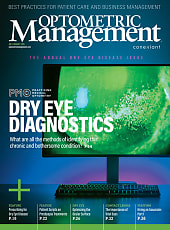BUSINESS
BUSINESS STRATEGIES
OVERCOMING FEE COMPLAINTS
ADD VALUE TO THE PATIENT VISIT, AND YOU WON’T HAVE TO DEAL WITH THIS
A PROSPECTIVE client called to ask about our services. As he wanted immediate information and was rushed, he did not understand the full scope of our consulting program. His response, “That’s expensive!” On a second call, he was more relaxed and had time to review our information in advance. That same doctor responded, “That sounds like a great deal and a great program!”
THE COST CONUNDRUM
Patients are acutely aware of the rising costs of healthcare, even those with insurance who aren’t directly paying the bill. In fact, for many, the “rising cost” is the increase either in premiums or their co-pay. Cost is certainly a front-of-mind event. In fact, with so many patients focused on cost, “optometric altruism” runs rampant in many a practice. Here’s a common exchange:
Patient: “You’re telling me there’s actually a charge for this visit? Seriously? The doctor hardly did anything!”
Staff: “Let me go check with the doctor.”
Staff to doctor: “Mrs. Frugal is complaining about the $2.17 charge for her visit. What should I do?”
Doctor: “Just give it to her for free. It’s not worth fighting over.”
Most doctors might think, Had I spent a little more time educating her, I could have avoided that discussion. Yet, for many of us, extra minutes aren’t easy to come by. And even if they are, after you’ve explained all you possibly can about a subconjunctival hemorrhage NOT being a grave concern, what else could you have said? You’re in the same predicament as we were with our rushed prospective client!
So, what can you do when time is a premium and patients are complaining about fees?
SLOW THE RUSH
The answer is simple: Work on everything that SURROUNDS the “rushed” event to make it feel less rushed. If working slower isn’t a practical option due to scheduling, consider what happens before and after each clinical event, and focus on what you can do to make those things more patient friendly. The reason: In the current setup for most docs, the pre/post-game activities are rote and non-memorable. So much so, in fact, that they are autopilot events that aren’t registered by the patient. As a result, the patient never gets a chance to overcome the “front of mind” slot that fees have.
For example, get insanely granular by examining every single step of your check-in procedure. Do you use a sign-in sheet? If so, why? Is it as patient friendly as possible? What does your staff say before and after the patient signs in? Is it obvious to the patient what happens next and why it happens next? Can, “Have a seat, and we’ll be right with you” be altered to be more friendly? What if it were changed to, “Thank you for signing in; can I get you something to drink while we prepare for your visit? If you’d like to get online, the password is EYESEE2020.” All these ideas, and then some, can be solicited at a staff meeting with the express goal of, “How can we make the sign-in process better?”
Now, expand this focus on an exemplary patient experience to every other aspect of the patient’s journey that surrounds his or her visit. How is he or she greeted and escorted to the exam room? What’s discussed, and how is it discussed? How, if at all, are the patient’s responses recorded or communicated? What happens after the exam?
INCREASE VALUE
Your competitors don’t have any more time available to them than you do. Are you using yours — and your patients’ — to your competitive advantage? Creating a more patient-friendly experience increases value, and, thus, greatly reduces complaints about fees. OM

| GARY GERBER, O.D. is the president of the Power Practice, a company specializing in making optometrists more profitable. Learn more at www.powerpractice.com, or call Dr. Gerber at (888) 356-4447. |



